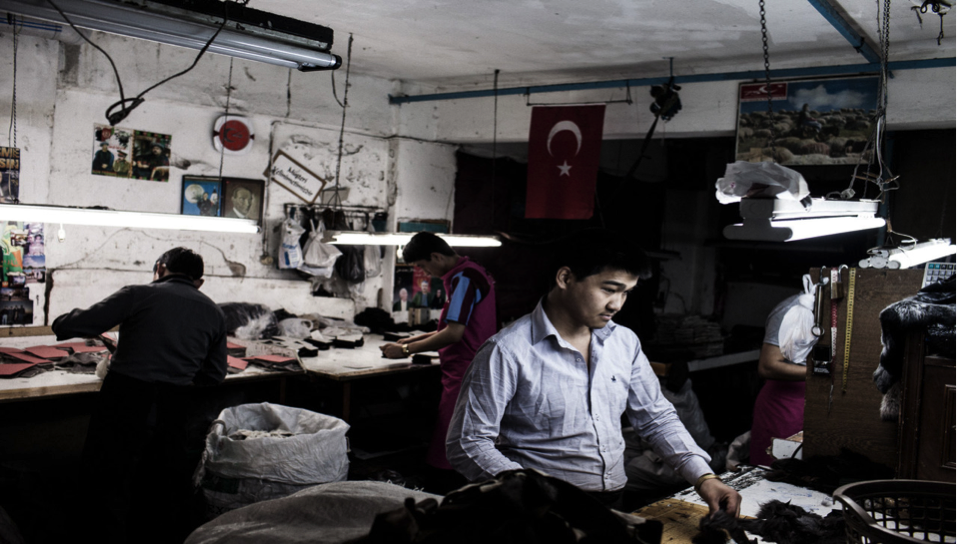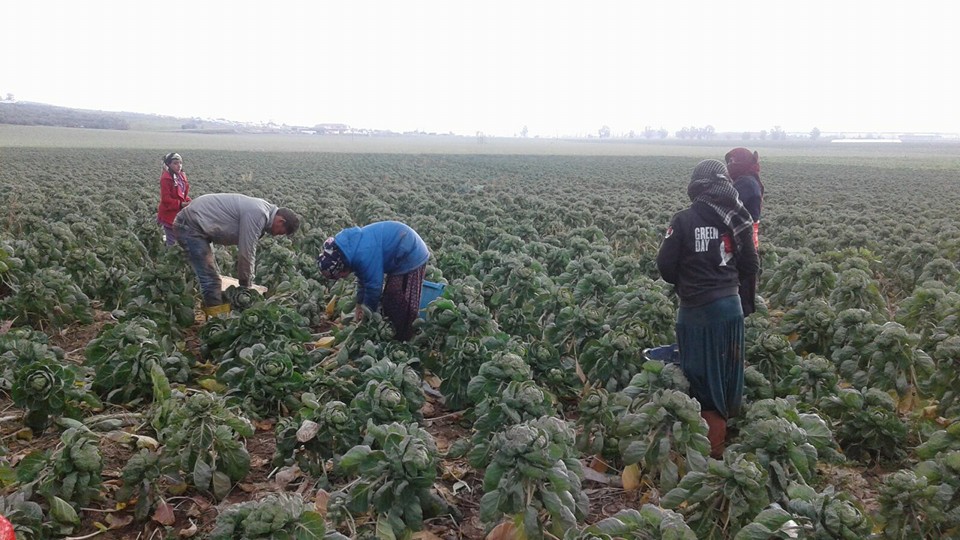Via ECRE – The NGO Refugees International has published a report entitled “I Am Only Looking for My Rights: Legal Employment Still Inaccessible to Refugees in Turkey”. Through a field research, refugees’ testimonies and an analysis of the applicable legal and policy provisions, the report examines the challenges and consequences that refugees face when they seek employment in Turkey. Continue reading The reality of legal employment to refugees in Turkey: lack of access and discrimination
Tag Archives: Migrant Labour
The Evolution of Afghan Migration in Istanbul

By Yiğit Seyhan
For Afghan refugees, Turkey is seen either as a bridge to reach Europe or as a country of immigration in which they want to settle and join their friends and relatives. The continuation of war, conflict and poverty in Afghanistan pushes millions of them to seek a life in other countries. The beginning of Afghan immigration towards Turkey goes back to the first half of the 1980s. Turkish authorities initiated the settlement of a few thousand Afghan refugees with ‘Turkish origin and culture’, including Turkmen, Kyrgyz, Uzbek and Hazara origins. Turkey had already signed the Geneva Convention in 1951, but it still preserves the geographical limitation and thus does not give the refugee status to people coming from outside Europe. However, it also implements the 1934 Law on Settlement (İskan Kanunu) and uses the flexibility of this legal framework. According to this law, persons of Turkish ethnic descent and culture can immigrate, settle in Turkey and eventually receive Turkish citizenship. Such initiatives have contributed to the long-term settlement of Afghans in Turkey, and thus Turkey is perceived as a possible immigration country by Afghans. Continue reading The Evolution of Afghan Migration in Istanbul
Navigating complexity and contradiction: an interview with a Gambian businessman in Istanbul
By Helen Mackreath
Jahara Import-Export business is located in a Beyazit warehouse composed of roughly one hundred businesses, of which around ten are run by, or employ majority of, African workers from Senegal and Gambia. It is owned by Mehmud Kebbeh, a Gambian man who identifies as a migrant and a business-man.

I first met Mehmud as an interlocutor for a separate research project. As a British researcher our initial conversation encompassed discussions of some of his time spent in London and the relationship between our two countries, including the legacies of colonialism, as well as respective feelings about our “foreigner” status in Turkey. I spoke to him further to understand more about the warehouse as a space of transit, of multiple criss-crossing identities across nationality, class, gender, religion. Our conversation indicated multiple ways in which he navigates the overlaps between his business, religious and national identities; the importance of his import-export space as a social setting where migrants shed restrictive identifiers and share commonalities; and the multiple areas of hierarchy, exchange and isolation within the Gambian and Senegalese communities. Continue reading Navigating complexity and contradiction: an interview with a Gambian businessman in Istanbul
Seasonal Agricultural Labor in Turkey: The Case of Torbalı

by Dilan Taşdemir, Association of Bridging People
** Türkçe aşağıda – Turkish version below **
İzmir, a city where 120,000 registered refugees live, has a lot of meaning for refugees. For some, it is a stop on their way to Europe when passing over by boats, for others, it is a city they come to in order to find seasonal work on the fields.
Seasonal agricultural labor in Turkey is not an issue that started with Syrian refugees. For years, Kurdish workers, mostly coming from the east and southeast of Turkey, have been working in agricultural areas in the Aegean, Çukurova, at the Black Sea and in Central Anatolia. There have been dozens of academic studies, news and documentaries on this issue, and it is still being studied today. In every respect, seasonal agricultural labor is a great burden to workers and must be considered as injustice. Continue reading Seasonal Agricultural Labor in Turkey: The Case of Torbalı
“We are not looking for providing jobs at home. We are aiming to create a safe environment or safe jobs outside of our houses.”
Syrian Women’s multiple burden at the labour market and at home.
by Rejane Herwig

The living conditions of Syrians in Turkey are for a majority very poor and tend to have a negative effect on a psychological as well as a physical level. Looking at those through a gender lens renders visible that such circumstances often have even more severe effects on women. Continue reading “We are not looking for providing jobs at home. We are aiming to create a safe environment or safe jobs outside of our houses.”
Migrant solidarity network on the resistance of saya-workers across Turkey
Via Migrant Solidarity Network – There has been news coming related to the strikes of saya (shoe-upper) workers from all corners of Turkey since more than a month. Saya workers organized boycotts and strikes in many cities from Konya to Manisa, from İzmir to Adana and from İstanbul to Antep because of following reasons: Non-covered employment without job security, bad working conditions and long working hours and ill-payments etc. Continue reading Migrant solidarity network on the resistance of saya-workers across Turkey
What’s changed for Syrian refugees in Turkish garment supply chains?
Via Business and Human Rights Research Center – An estimated 650,000 Syrian refugees have fled their home country to escape bloodshed and have found a lifeline working in Turkey, with many working in the garment industry. Without these jobs, many families would face desperate times and would struggle to support themselves. However, the garment industry in Turkey is complex and exploitative conditions are too common. Since 2015, reports and investigations have exposed poor wages, discrimination, and child labour by Syrian refugees working in the Turkish garment industry. Continue reading What’s changed for Syrian refugees in Turkish garment supply chains?
Shoe Workers Went on Strike Across Turkey
The resistance started in Adana in September 2017 and spread to İstanbul, Gaziantep, Konya, İzmir and Manisa within a few days. In almost all cities, the resistance resulted in the victory of the workers. The solidarity between Syrian and Turkish workers is the prominent character of this strike. [1]
The workers went on strike with the demands of 25% wage increase, 10% wage increase each year and the demand that Syrian workers – who take the lowest wage among the shoe workers- must be given the same wage as given to the rest of the shoe workers. [2]
The resistance of Turkish, Kurdish and Syrian shoe workers against labor exploitation – uninsured, unsecured and low-paying working conditions- has been running on. In İzmir, the workers still keep on organizing demonstrations to put across their demands. [3]
Building Markets Report Highlights ‘Another Side to the Story’ on Syrian SMEs in Turkey
Via cidpnsi – The devastating scale of the humanitarian crisis in Syria has internally displaced more than six million people and forced five million more to flee across the border into neighbouring countries. The experiences of these refugees have often been reduced to a single narrative where newcomers are seen as burdens on their host communities. However, a closer look at the capabilities and contributions of Syrian-owned SMEs operating in Turkey reveals ‘another side to the story’. Continue reading Building Markets Report Highlights ‘Another Side to the Story’ on Syrian SMEs in Turkey
Report on “Syrian Refugee Labor” by Turkish Metalworkers’ Union
Via Hurriyet DailyNews – At a time when the number of racist attacks targeting Syrian refugees in Turkey is on the rise, the United Metalworkers’ Union (Birleşik Metal İş Sendikası) issued a report called “Syrian Refugee Labor.” We have thus seen once again how most of the three million Syrian refugees are living under difficult conditions here.
Eight academics from various universities drafted the report. Face to face interviews were conducted with both Turkish and Syrian workers in the textile sector. The result is striking but not unexpected, because we knew that Syrian workers were unregistered and highly underpaid.
The report said 99.6 percent of male Syrian workers and 100 percent of female Syrian workers were unregistered. As an example of the pay gap between Syrian and Turkish workers, the average pay of Syrian women workers corresponds to only half of the average Turkish male worker’s pay. Continue reading →
